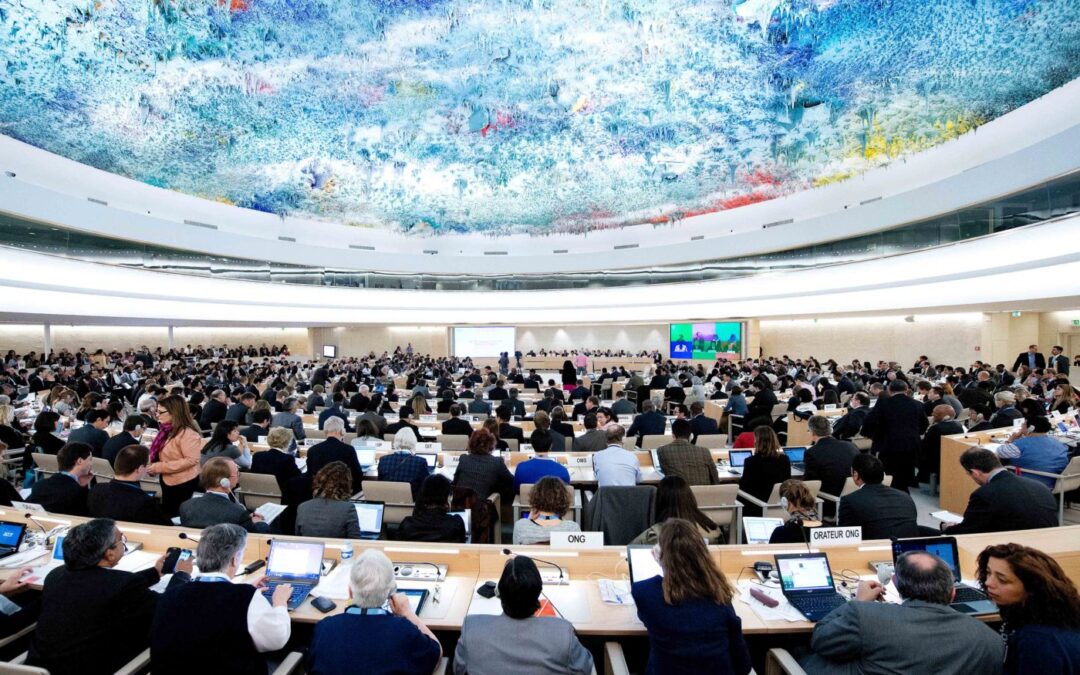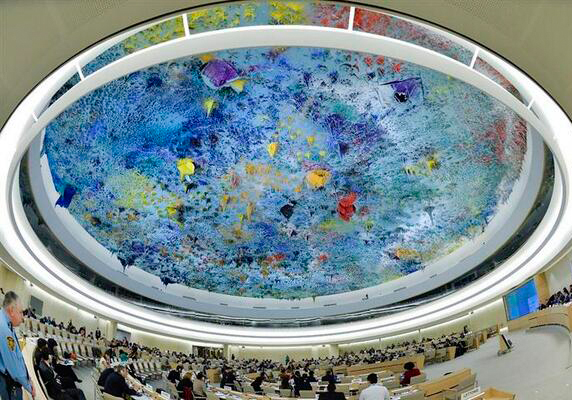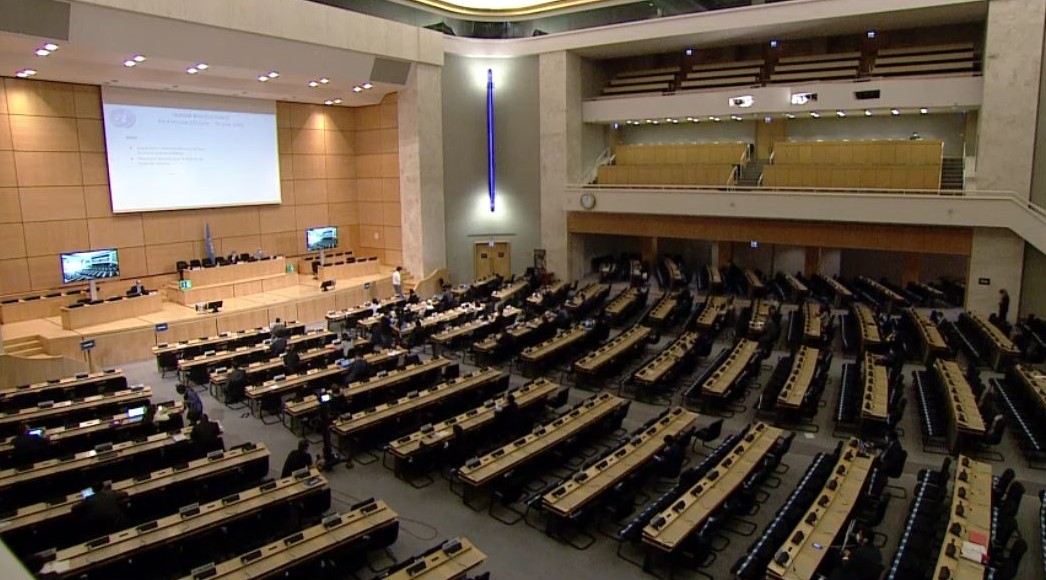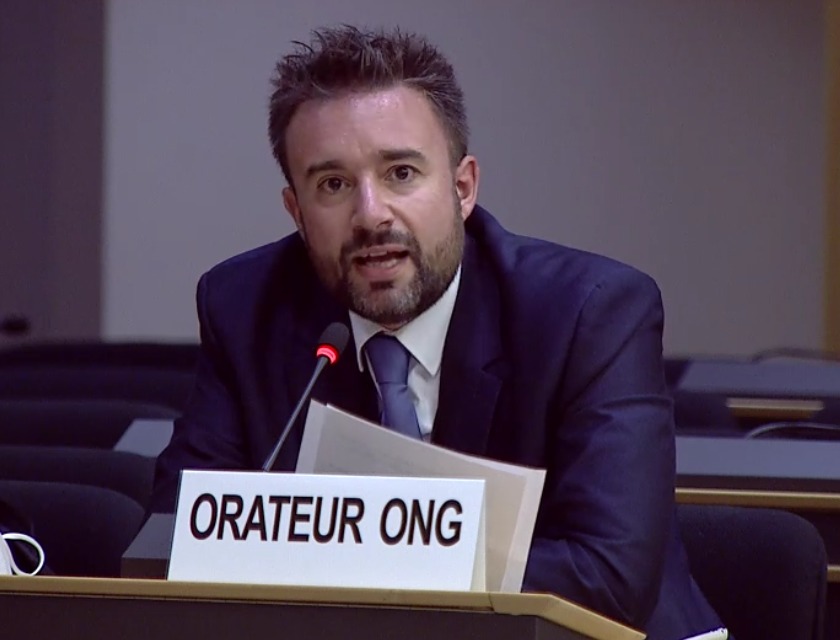
Sep 15, 2023 | Advocacy, Human Rights Council, News, Statements, Work with the UN
The ICJ welcomes the last report of Mr. Fabian Salvioli as he ends his 6-year tenure as the UN Special Rapporteur on truth, justice, reparation and guarantees of non-recurrence. The report, presented to the UN Human Rights Council (HRC) on 14 September 2023, compiles and analyses existing international standards under the five pillars of transitional justice: truth, justice, reparation, memorialization and guarantees of non-recurrence.

Sep 30, 2021 | Advocacy, Non-legal submissions
Before the UN Human Rights Council, the ICJ today expressed support on the High Commissioner for Human Rights’ call to ban AI applications that are not human rights compliant and expressed support for UN Special Procedures’ work.

Mar 17, 2021 | Advocacy, Non-legal submissions
Today, the ICJ joined Amnesty International and other 14 NGOs to express concern at continued attacks on the Special Procedures of the UN Human Rights Council by some States and at efforts to undermine their independence.
The joint statement reads as follows:
“Madame President,
Amnesty International delivers this statement on behalf of 15 NGOs.
We are deeply concerned by continued attacks on the Special Procedures and efforts to undermine their independence. We urge all states to affirm their commitment to human rights and the effectiveness of the international human rights system, by rejecting and condemning these efforts.
We welcome the continued efforts of the Coordination Committee to address objective non-compliance of mandate holders under the Internal Advisory Procedure, including in response to the failure of the Special Rapporteur on the right to privacy to submit his reports to the Council in time for their consideration at this session. We urge all states to support the Coordination Committee in their efforts to respond to concerns related to the working methods of the Special Procedures, as well as complaints against individual mandate holders.
At the same time, we deplore the efforts of some states to use this process as a cover to undermine the independence and effectiveness of the Special Procedures for political reasons. As on numerous previous occasions, certain states repeatedly accuse the Special Procedures of politicization but fail to substantively address the human rights concerns they raise.
We particularly regret the Russian Federation’s efforts, on 5 March, to suspend the HRC session altogether and their continued attempts, together with other states, to introduce unwarranted state oversight on the Special Procedures.
We were also alarmed to witness personal attacks on the Special Procedures, most worryingly against the Special Rapporteur on freedom of religion or belief, by the Chinese delegation, who during the interactive dialogue accused the mandate holder of ‘spread[ing] false information’ and ‘lack[ing] minimum professional ethics.” Such ad hominem attacks are unacceptable, and the Council must respond in the strongest terms to condemn such incidents. They also reveal a broader rejection of dialogue on human rights challenges – despite repeated statements urging the Council to privilege ‘dialogue and cooperation’ – and a lack of willingness on the part of the state concerned to take action to protect human rights.
It is time for states at this Council to take a strong proactive stand for its independent mechanisms, ensuring that they have the support and resources needed to fulfil their mandates and to hold states accountable when they commit human rights violations.
Thank you.”
The signatories of the statement are:
- Amnesty International
- ARTICLE 19
- Asian Forum for Human Rights and Development (FORUM-ASIA)
- Center for Reproductive Rights
- CIVICUS: World Alliance for Citizen Participation
- DefendDefenders (East and Horn of Africa Human Rights Defenders Project)
- Forum Menschenrechte e.V.
- Human Rights House Foundation
- Human Rights Watch
- International Commission of Jurists
- International Federation for Human Rights (FIDH)
- International Movement Against All Forms of Discrimination and Racism (IMADR)
- International Service for Human Rights (ISHR)
- Privacy International
- Women’s International League for Peace and Freedom
Contact:
Massimo Frigo, ICJ UN Representative, e: massimo.frigo(a)icj.org, t: +41797499949

Sep 29, 2020 | Advocacy, Non-legal submissions
At the Human Rights Council, the ICJ and other NGOs highlighted with concern renewed attacks against the Council’s independent experts, aimed at interfering with their independence.
The oral statement was delivered by Amnesty International, in the general debate on human rights bodies, on on behalf of 14 NGOs. It read as follows:
“It is with great concern that we note the renewed attacks against the Special Procedures of this Council, through which certain states seek to interfere with their independence and impose political oversight over individual experts. While we welcome the outcome of the informal discussions, we would like to raise a few issues of concern.
As we noted in our letter to you Madame President, the states signatories of the letters rely on PRST 8/2 of 18 June 2008 on the Terms of office of special procedure mandate-holders, which was originally adopted in the specific context of Council discussions on the extension of the terms of mandate holders, and should not be regarded as a wider framework for assessing the performance of mandate holders. Furthermore, the groups of states appear to have ignored the existing Internal Advisory Procedure, instead proceeding directly to attempts to impose political oversight by this Council.
We also note with great concern that several of the signatory states launched wholly inappropriate attacks of a personal nature against Special Procedure mandate holders in the past.1
The allegations presented against the Special Rapporteur on extrajudicial, summary or arbitrary executions, in particular, seem little more than objecting to her being especially effective and proactive in doing exactly what this Council has tasked her to do, including monitoring and reporting on violations of the right to life and bringing these to the attention of the Council, and promoting respect for the right to life more generally.
We appreciate the efforts by the Coordination Committee to address broader issues related to the working methods of the Special Procedures, and welcome its willingness to work with the Special Rapporteur on the right to privacy on issues related to methodology and programming of the six outstanding country reports.
The independence of the Special Procedures is absolute in nature, and any attempts to erode that status threatens the credibility and integrity of this Council.
Thank you.”
Amnesty International
ARTICLE 19
Asian Forum for Human Rights and Development (FORUM-ASIA)
Center for Reproductive Rights
Child Rights Connect
CIVICUS: World Alliance for Citizen Participation
DefendDefenders (East and Horn of Africa Human Rights Defenders Project)
Geneva for Human Rights
International Commission of Jurists
International Federation for Human Rights (FIDH)
International Movement Against All Forms of Discrimination and Racism (IMADR)
International Service for Human Rights
Privacy International
Women’s International League for Peace and Freedom (WILPF)
1 Amnesty International and ISHR: HRC 37: Item 5: Human rights bodies and mechanisms, 14 March 2018, Index number: IOR 40/8032/2018, https://www.amnesty.org/en/documents/ior40/8032/2018/en/

Sep 21, 2020 | Advocacy, Non-legal submissions
At the interactive dialogue with the Working Group on Enforced and Involunatary Disapparances during the UN Human Rights Council in Geneva, the ICJ has called on Tajikistan and Turkey to comply with the recommendations by the Working Group and to end practices of abduction and forced return.
The Chair of the Working Group on Enforced and Involuntary Disapperances in his replies to the questions pressed Turkey to implement the recommendations of the Working Group’s report.
The oral statement read as follows:
Mr Vice-President
The International Commission of Jurists (ICJ) welcomes the report by the Working Group on the follow up of its recommendations on its visit to Turkey (A/HRC/45/13/Add.4) and shares its concerns at the lack of implementation by the Turkish authorities and at the State-sponsored practice of “abductions and forced returns” (para 8). The ICJ agrees with the Working Group that a critical factor that fosters impunity in Turkey is “the lack of judicial independence and impartiality” (para 17).
The ICJ also welcomes the Working Group’s report on Tajikistan (A/HRC/45/13/Add.1). The ICJ shares its concern at the forcible return of Tajikistan nationals to the country, involving enforced disappearances (para 53), the harassment of lawyers (para 9) including the lengthy imprisonment of Buzurgmehr Yorov and Nuriddin Makhkamov, the obstruction of lawyers’ access to detainees, and inadequate judicial review of detention (para 47).
The ICJ urges both countries to fully implement the recommendations of the Working Group and particularly:
- on Tajikistan, to end forced return of their nationals, and to ensure prompt and confidential access to lawyers for detainees and prompt and independent judicial review of detention.
- on Turkey, to stop all practices of abduction and forced return from other countries and to restore the independence of its judiciary.









